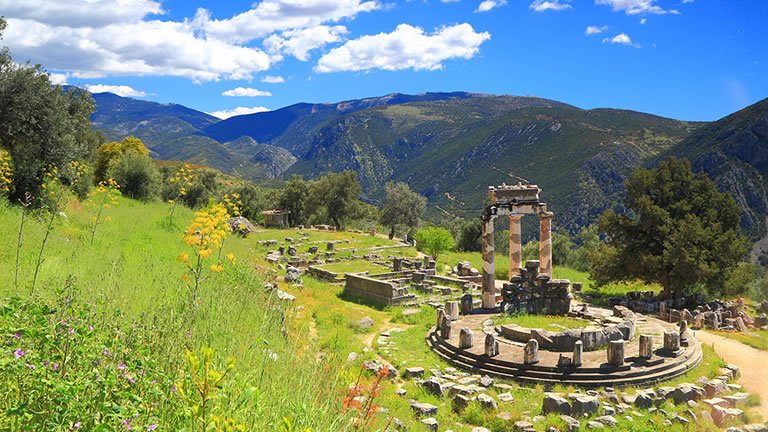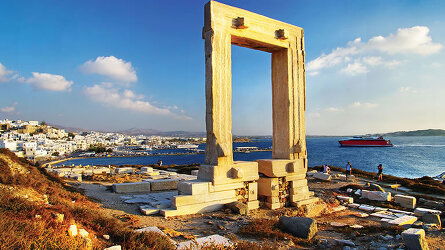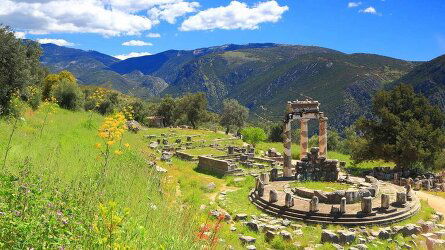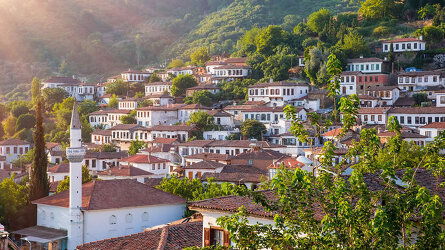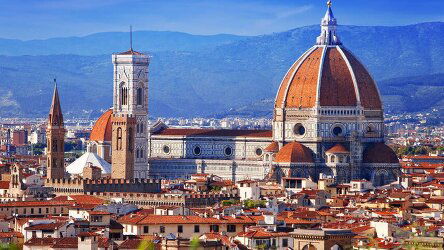Overview
Itinerary
Our tour starts in Athens, Greece's historic hub. The city is a heady mix of ancient and modern, having been the capital of Greece for less than two centuries, but with a history dating back over 3,000 years. Located on the Plain of Attica, it's also an area of breathtaking scenery, set against a backdrop of mountains and stretching to the blue coast.
For those arriving on time, our tour leader will meet you in the hotel reception at 7.00 pm and, for those that wish, there'll be the chance to go out for dinner. Due to a number of flights arriving into Athens later in the evening, our welcome meeting will take place on the morning of day two.
There are no activities planned today, so you\ re free to arrive in Athens at any time. If you\ d like an airport transfer, you'll need to arrive into Athens International Airport (ATH), which is around a one-hour drive from our hotel.
If your flight arrives earlier in the day, you might like to visit one of the cafes in the colourful Psyrri district, which offer traditional Greek cuisine of scrumptious aubergines, tomatoes and cheese washed down with ouzo or raki. There are traditional rustic tavernas in the well-known Plaka area at the foot of the Acropolis, too. Stay: Hotel Evripides (Comfortable)
After our tour leader holds an initial welcome meeting this morning, we'll take an orientation walking tour which will take us past the Parliament buildings, through Syntagma Square and into the Plaka, to soak up the atmosphere of the old town. You'll notice the contrast between the modern capital and the old city - the well-heeled inhabitants of Kolonaki on the one hand, and the vibrant Plaka quarter on the other.
In the late morning, we'll head for a guided tour of the Acropolis to discover the ruins of the Athens of Pericles - the Propylaea (or marble entrance hall), the Parthenon (built by Ictinos 2500 years ago), the Temple of Athena Nike (the Wingless Victory), and the Erechtheion.
Tradition dictates that the gods Athena and Poseidon quarrelled here. The sea god struck the rock with his trident, causing salt water to gush out, while Athena struck it with her spear and brought forth an olive tree. As olives were deemed to be more useful, the other gods let her take the city under her protection.
Please note, depending on our allotted time to see the Acropolis, we might need to rearrange our sightseeing schedule.
For those wishing to see more of Athens, it's well worth visiting the highly acclaimed Acropolis Museum to see the layers of history painstakingly excavated right beneath your feet. It's now possible to see the ruins of the ancient Athenian neighbourhood that stood on this very site millennium ago. The museum closes at 5pm on a Monday, we recommend pre-booking a ticket online to avoid a long queue. As there's not much time today, you might consider going on day 1 before our tour starts. Stay: Hotel Evripides (Comfortable) (B)
Leaving Athens after an early breakfast, we'll travel to Nafplion - the first capital of modern Greece and one of the most beautiful coastal towns in the Peloponnese. On our way we stop at Epidavros. Dedicated to Asclepius, the healing god and legendary son of Apollo, the sanctuary of Epidavros was one of the most important of the ancient world, and it remained a site of pilgrimage from the sixth century BC to Roman times. Epidavros is home to one of the greatest and best-preserved of all ancient Greek theatres. With its backdrop of rolling hills, this 14,000-seat arena merges perfectly into the landscape, so much so that it was only rediscovered and unearthed in the last century. The acoustics of the amphitheatre are so incredible, it's said that even those sat on the highest tier will hear a coin drop on stage. After exploring the site, continue to Nafplion by bus to enjoy an evening promenade and dinner at one of the many harbourfront restaurants. Stay: Victoria Hotel (Comfortable) (B)
Today we'll ascend to the Palamidi Fortress to take in the views. The Palamidi is comprised of three separate fortresses walled together. It was built in 1714 by the Venetians, taken by the Turks the following year, and held until they surrendered it to Kolokotronis after a fifteen-month siege during the War of Independence. After we make the 850-step ascent to the fortress (taxis are also available), we'll then travel back to Nafplion for a few afternoon to explore the area. We recommend walking to Arvanitia Beach and then on to Karathona, a beautiful costal walk. Stay: Victoria Hotel (Comfortable) (B)
Leaving Nafplion behind us, we'll first travel north to visit the mighty ruins of ancient Mycenae. Then, we'll head south towards the heart of the Mani Peninsula.
Perched on a hilltop overlooking the modern city, Mycenae is connected to the legend of King Agamemnon who commanded the ten-year expedition against Troy. The site was unearthed by the archaeologist Schliemann in the 1870s and is prized for its Lion Gate and Royal Tombs. Equally impressive are the 'beehive tombs' which include the Treasury of Atreus (the lintel over the monumental Atreus door weighs over 120 tons). Inside, the structure is awesome - the principal chamber dates from about 1350 BC and emulates the grandeur of the Egyptian pharaohs.
This afternoon, we'll move on to Gythio. Stay: Pantheon City Hotel (Comfortable) (B)
Gythio is a charming coastal town (really a large village) on the Mani Peninsula. Gythio has a rich history dating back to ancient times. It was once the ancient port of Sparta and served as a major naval power. The town has remnants of historical sites, including the Tzanetakis Tower and the island of Marathonisi. The town is known for its picturesque setting with colorful neoclassical buildings lining the waterfront. Today has been left free to soak up the atmosphere of Gythio.
Alternatively, you can take a trip to the nearby town of Monemvasia ('Greece's Gibraltar'). This 13th-century Byzantine fortress town occupies a steep, rocky islet which is connected to the coast by a bridge - it was amongst the first of the Peloponnese fortified towns to be liberated by the Greeks in 1821. Stay: Pantheon City Hotel (Comfortable) (B)
The Mani Peninsula is naturally isolated and traditionally independent - the people who inhabit its wild landscape have always resisted change and clung to their ancient traditions. In addition to its history of piracy, the feudal society which developed here around the 14th century has left a unique architectural legacy in the form of marble-roofed tower houses, once used as a defence against enemy clans and as a sign of family prestige.
Today, we'll charter a bus to discover this fascinating region, visiting Cape Tenaro; the southernmost point of mainland Greece, Girolimenas and Vathia fortified village. Stay: Pantheon City Hotel (Comfortable) (B)
Leaving the Mani Peninsula, this morning we'll head north to the abandoned medieval town of Mystras. Clinging to a steep flank of the Taygetos range, some 150 metres above the plain, Mystras might be silent and ruined today but it's nevertheless evocative of the people who once lived here and made it prosperous.
We'll wander the cobbled alleyways, exploring the various sun-bleached palaces and houses along the way. Although only ruins remain, the architectural styles and artistic excellence of many wall paintings, mosaics and decorative sculptures are worthy of close inspection. In the Upper Town is the vast arched hall of the Palace of the Despots, with its two standing towers. The beautiful Pantanassa Church, still used by a few smiling nuns, combines both Byzantine and Gothic elements and has some fine frescoes. Crowning the summit is the original Frankish Castle (Kastro) with its breathtaking overview of the plain of Sparta. Walking through this phantom city, with its scattered ruins, is like taking a journey back through time.
Later, we'll continue to the delightful little harbour town of Pylos. Stay: Hotel Galaxy (Comfortable) (B)
Today, we'll spend the day in picturesque Pylos, amid olive trees, rocky meadows, and offshore islands. The area around Pylos is ideal for personal explorations, on foot or by local transport.
This morning, we'll visit one of the best-preserved castles in Greece, the Neokastro, built during the Turkish occupation in 1573 to control the western coast of the Peloponnese. Then, this afternoon, you might like to take a local bus to Methoni (ten kilometres to the south), possibly the most beautiful Venetian stronghold in Greece and home to an imposing 15th-century castle. If you feel like exploring more, you could take a taxi and walk along Gialova Lagoon to a medieval castle, and on to Nestor's Cave, finishing at a beautiful horseshoe-shaped white-sand beach. Stay: Hotel Galaxy (Comfortable) (B)
Driving north this morning, we'll make a brief stop at the Vaulted Tomb of Ano Anglianos, which is the largest of its kind in the area. It was used throughout the 15th century, and perhaps even later, as a family tomb and is estimated to contain at least 17 burials.
Next, we'll drive on to the ruined monuments of ancient Olympia, the birthplace of the Olympic games and one of Greece's most renowned historical sites. The site lies in an enchanting valley setting close to the modern-day town of Nea Olympia and we'll take it in with a guided tour. The first monuments to be constructed were in the Altis (or sacred grove) and date back to the 9th and 10th centuries BC. Estimates indicate the games first began in 776 BC, after the worship of Zeus was established. Initially, all the principal Greek cities took part in the Olympiads (which were held every four years).
As well as wandering through the remains of the gymnasium, wrestling school, stadium, and the Temple of Zeus, you can visit the excellent Archaeological Museum (optional) which has many remarkable exhibits on view. Stay: Olympic Village Hotel (Comfortable) (B)
From Olympia, we'll head north. A scenic drive will take us through the largest olive grove in Greece to reach Delphi, where we'll have a guided tour.
Perched on the rocky slopes of sacred Mount Parnassos (2459 metres), Delphi was the perfect setting for mystery and religious prophecy. Here, the god Apollo spoke through the medium of a priestess called the Pythia. After drinking the waters of the nearby Castalian Spring, said to echo with the prophetic voices of Apollo's muses, she swooned over intoxicating fumes emitted from a crack in the ground and uttered strange phrases, which the priests then translated into verse and gave to the faithful. The answers were so ambiguous that whatever happened they were bound to come true.
The site's famous antiquities, including the Temple of Apollo, theatre, stadium and Marmaria Sanctuary are wonderfully picturesque, and the museum contains the much admired 'charioteer'. Stay: Acropole Delphi Hotel (Comfortable) (B)
This morning, there'll be the chance to take an optional walk to the Temple of Athena to stretch your legs before we take the bus back to the capital. Along the way, we'll make a photo stop in the pretty mountain village of Arachova.
On arrival in Athens, the afternoon is free to explore or relax in one of the city's many cafes. Stay: Hotel Evripides (Comfortable) (B)
Our tour ends after breakfast at our hotel in Athens.
There are no activities planned today, so you\ re free to depart at any time. If your flight is departing later in the day, luggage storage facilities are available at our hotel. If you\ d like an airport transfer today, you'll need to depart from Athens International Airport (ATH), which is about a one-hour drive from the hotel. (B)
Our tour starts in Athens, Greece's historic hub. The city is a heady mix of ancient and modern, having been the capital of Greece for less than two centuries, but with a history dating back over 3,000 years. Located on the Plain of Attica, it's also an area of breathtaking scenery, set against a backdrop of mountains and stretching to the blue coast.
For those arriving on time, our tour leader will meet you in the hotel reception at 7.00 pm and, for those that wish, there'll be the chance to go out for dinner. Due to a number of flights arriving into Athens later in the evening, our welcome meeting will take place on the morning of day two.
There are no activities planned today, so you\ re free to arrive in Athens at any time. If you\ d like an airport transfer, you'll need to arrive into Athens International Airport (ATH), which is around a one-hour drive from our hotel.
If your flight arrives earlier in the day, you might like to visit one of the cafes in the colourful Psyrri district, which offer traditional Greek cuisine of scrumptious aubergines, tomatoes and cheese washed down with ouzo or raki. There are traditional rustic tavernas in the well-known Plaka area at the foot of the Acropolis, too. Stay: Hotel Evripides (Comfortable)
After our tour leader holds an initial welcome meeting this morning, we'll take an orientation walking tour which will take us past the Parliament buildings, through Syntagma Square and into the Plaka, to soak up the atmosphere of the old town. You'll notice the contrast between the modern capital and the old city - the well-heeled inhabitants of Kolonaki on the one hand, and the vibrant Plaka quarter on the other.
In the late morning, we'll head for a guided tour of the Acropolis to discover the ruins of the Athens of Pericles - the Propylaea (or marble entrance hall), the Parthenon (built by Ictinos 2500 years ago), the Temple of Athena Nike (the Wingless Victory), and the Erechtheion.
Tradition dictates that the gods Athena and Poseidon quarrelled here. The sea god struck the rock with his trident, causing salt water to gush out, while Athena struck it with her spear and brought forth an olive tree. As olives were deemed to be more useful, the other gods let her take the city under her protection.
Please note, depending on our allotted time to see the Acropolis, we might need to rearrange our sightseeing schedule.
For those wishing to see more of Athens, it's well worth visiting the highly acclaimed Acropolis Museum to see the layers of history painstakingly excavated right beneath your feet. It's now possible to see the ruins of the ancient Athenian neighbourhood that stood on this very site millennium ago. The museum closes at 5pm on a Monday, we recommend pre-booking a ticket online to avoid a long queue. As there's not much time today, you might consider going on day 1 before our tour starts. Stay: Hotel Evripides (Comfortable) (B)
Leaving Athens after an early breakfast, we'll travel to Nafplion - the first capital of modern Greece and one of the most beautiful coastal towns in the Peloponnese. On our way we stop at Epidavros. Dedicated to Asclepius, the healing god and legendary son of Apollo, the sanctuary of Epidavros was one of the most important of the ancient world, and it remained a site of pilgrimage from the sixth century BC to Roman times. Epidavros is home to one of the greatest and best-preserved of all ancient Greek theatres.
With its backdrop of rolling hills, this 14,000-seat arena merges perfectly into the landscape, so much so that it was only rediscovered and unearthed in the last century. The acoustics of the amphitheatre are so incredible, it's said that even those sat on the highest tier will hear a coin drop on stage. After exploring the site, continue to Nafplion by bus to enjoy an evening promenade and dinner at one of the many harbourfront restaurants. Stay: Victoria Hotel (Comfortable) (B)
Today we'll ascend to the Palamidi Fortress to take in the views. The Palamidi is comprised of three separate fortresses walled together. It was built in 1714 by the Venetians, taken by the Turks the following year, and held until they surrendered it to Kolokotronis after a fifteen-month siege during the War of Independence. After we make the 850-step ascent to the fortress (taxis are also available), we'll then travel back to Nafplion for a few afternoon to explore the area. We recommend walking to Arvanitia Beach and then on to Karathona, a beautiful costal walk. Stay: Victoria Hotel (Comfortable) (B)
Leaving Nafplion behind us, we'll first travel north to visit the mighty ruins of ancient Mycenae. Then, we'll head south towards the heart of the Mani Peninsula.
Perched on a hilltop overlooking the modern city, Mycenae is connected to the legend of King Agamemnon who commanded the ten-year expedition against Troy. The site was unearthed by the archaeologist Schliemann in the 1870s and is prized for its Lion Gate and Royal Tombs. Equally impressive are the 'beehive tombs' which include the Treasury of Atreus (the lintel over the monumental Atreus door weighs over 120 tons). Inside, the structure is awesome - the principal chamber dates from about 1350 BC and emulates the grandeur of the Egyptian pharaohs.
This afternoon, we'll move on to Gythio. Stay: Pantheon City Hotel (Comfortable) (B)
Gythio is a charming coastal town (really a large village) on the Mani Peninsula. Gythio has a rich history dating back to ancient times. It was once the ancient port of Sparta and served as a major naval power. The town has remnants of historical sites, including the Tzanetakis Tower and the island of Marathonisi. The town is known for its picturesque setting with colorful neoclassical buildings lining the waterfront. Today has been left free to soak up the atmosphere of Gythio.
Alternatively, you can take a trip to the nearby town of Monemvasia ('Greece's Gibraltar'). This 13th-century Byzantine fortress town occupies a steep, rocky islet which is connected to the coast by a bridge - it was amongst the first of the Peloponnese fortified towns to be liberated by the Greeks in 1821. Stay: Pantheon City Hotel (Comfortable) (B)
The Mani Peninsula is naturally isolated and traditionally independent - the people who inhabit its wild landscape have always resisted change and clung to their ancient traditions. In addition to its history of piracy, the feudal society which developed here around the 14th century has left a unique architectural legacy in the form of marble-roofed tower houses, once used as a defence against enemy clans and as a sign of family prestige.
Today, we'll charter a bus to discover this fascinating region, visiting Cape Tenaro; the southernmost point of mainland Greece, Girolimenas and Vathia fortified village. Stay: Pantheon City Hotel (Comfortable) (B)
Leaving the Mani Peninsula, this morning we'll head north to the abandoned medieval town of Mystras. Clinging to a steep flank of the Taygetos range, some 150 metres above the plain, Mystras might be silent and ruined today but it's nevertheless evocative of the people who once lived here and made it prosperous.
We'll wander the cobbled alleyways, exploring the various sun-bleached palaces and houses along the way. Although only ruins remain, the architectural styles and artistic excellence of many wall paintings, mosaics and decorative sculptures are worthy of close inspection. In the Upper Town is the vast arched hall of the Palace of the Despots, with its two standing towers.
The beautiful Pantanassa Church, still used by a few smiling nuns, combines both Byzantine and Gothic elements and has some fine frescoes. Crowning the summit is the original Frankish Castle (Kastro) with its breathtaking overview of the plain of Sparta. Walking through this phantom city, with its scattered ruins, is like taking a journey back through time.
Later, we'll continue to the delightful little harbour town of Pylos. Stay: Hotel Galaxy (Comfortable) (B)
Today, we'll spend the day in picturesque Pylos, amid olive trees, rocky meadows, and offshore islands. The area around Pylos is ideal for personal explorations, on foot or by local transport.
This morning, we'll visit one of the best-preserved castles in Greece, the Neokastro, built during the Turkish occupation in 1573 to control the western coast of the Peloponnese. Then, this afternoon, you might like to take a local bus to Methoni (ten kilometres to the south), possibly the most beautiful Venetian stronghold in Greece and home to an imposing 15th-century castle. If you feel like exploring more, you could take a taxi and walk along Gialova Lagoon to a medieval castle, and on to Nestor's Cave, finishing at a beautiful horseshoe-shaped white-sand beach. Stay: Hotel Galaxy (Comfortable) (B)
Driving north this morning, we'll make a brief stop at the Vaulted Tomb of Ano Anglianos, which is the largest of its kind in the area. It was used throughout the 15th century, and perhaps even later, as a family tomb and is estimated to contain at least 17 burials.
Next, we'll drive on to the ruined monuments of ancient Olympia, the birthplace of the Olympic games and one of Greece's most renowned historical sites. The site lies in an enchanting valley setting close to the modern-day town of Nea Olympia and we'll take it in with a guided tour. The first monuments to be constructed were in the Altis (or sacred grove) and date back to the 9th and 10th centuries BC. Estimates indicate the games first began in 776 BC, after the worship of Zeus was established. Initially, all the principal Greek cities took part in the Olympiads (which were held every four years).
As well as wandering through the remains of the gymnasium, wrestling school, stadium, and the Temple of Zeus, you can visit the excellent Archaeological Museum (optional) which has many remarkable exhibits on view. Stay: Olympic Village Hotel (Comfortable) (B)
From Olympia, we'll head north. A scenic drive will take us through the largest olive grove in Greece to reach Delphi, where we'll have a guided tour.
Perched on the rocky slopes of sacred Mount Parnassos (2459 metres), Delphi was the perfect setting for mystery and religious prophecy. Here, the god Apollo spoke through the medium of a priestess called the Pythia. After drinking the waters of the nearby Castalian Spring, said to echo with the prophetic voices of Apollo's muses, she swooned over intoxicating fumes emitted from a crack in the ground and uttered strange phrases, which the priests then translated into verse and gave to the faithful. The answers were so ambiguous that whatever happened they were bound to come true.
The site's famous antiquities, including the Temple of Apollo, theatre, stadium and Marmaria Sanctuary are wonderfully picturesque, and the museum contains the much admired 'charioteer'. Stay: Acropole Delphi Hotel (Comfortable) (B)
This morning, there'll be the chance to take an optional walk to the Temple of Athena to stretch your legs before we take the bus back to the capital. Along the way, we'll make a photo stop in the pretty mountain village of Arachova.
On arrival in Athens, the afternoon is free to explore or relax in one of the city's many cafes. Stay: Hotel Evripides (Comfortable) (B)
Our tour ends after breakfast at our hotel in Athens.
There are no activities planned today, so you\ re free to depart at any time. If your flight is departing later in the day, luggage storage facilities are available at our hotel. If you\ d like an airport transfer today, you'll need to depart from Athens International Airport (ATH), which is about a one-hour drive from the hotel. (B)
Trip Inclusions
- Discover Athens old town and have the chance to visit the Acropolis
- See the ancient ruins of Olympia, the birthplace of the Olympic Games
- Explore wild landscapes and fantastic sea views on the Mani Peninsula
- Full on paced trips are for travellers who like their holidays packed with activities and experiences, moving on quickly from place to place with lots of early starts and long, busy days. Some may find them tiring, but others get a buzz from packing their precious holiday-time as chock-a - block full of new experiences as possible.
- Accommodation, itinerary and inclusions subject to change.
- Price is for land, cruise and internal flights as specified. Flights not specified are not included
- Discover Athens old town and have the chance to visit the Acropolis
- See the ancient ruins of Olympia, the birthplace of the Olympic Games
- Explore wild landscapes and fantastic sea views on the Mani Peninsula
- Full on paced trips are for travellers who like their holidays packed with activities and experiences, moving on quickly from place to place with lots of early starts and long, busy days. Some may find them tiring, but others get a buzz from packing their precious holiday-time as chock-a - block full of new experiences as possible.
- Accommodation, itinerary and inclusions subject to change.
- Price is for land, cruise and internal flights as specified. Flights not specified are not included

Launching in 1981, Explore offer trips from over 130 countries - from classic small group tours. Read more
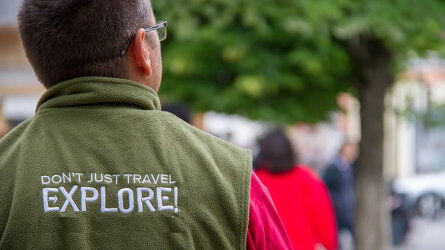
Explore's leaders are more than just your typical guide. They're your local expert are are passionate about sharing their expertise with you. Read more
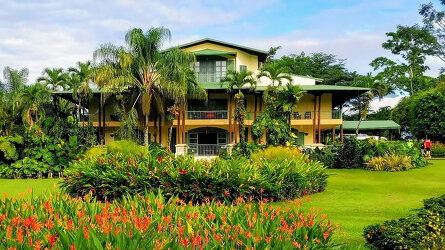
The places Explore stay are every bit as important as the sights they visit and the things you do. Read more

Launching in 1981, Explore offer trips from over 130 countries - from classic small group tours. Read more

Explore's leaders are more than just your typical guide. They're your local expert are are passionate about sharing their expertise with you. Read more

The places Explore stay are every bit as important as the sights they visit and the things you do. Read more
Trip Reviews (1) Most Recent 'Peloponnese Explorer' Reviews
Brochure

Explore Small Group Adventures (2024-25)
Availability
A definite departure means minimum numbers have been reached for this departure to operate. Your Global Journeys Travel Advisor will check the availability of your departure date when you enquire. Additional savings may apply. We guarantee the lowest price in Australia. T&C’s apply.
Tour & cruises prices are per person. Prices shown have savings applied, are subject to availability and may be withdrawn at any time without notice. Pricing and trip details are correct at this point in time, however are subject to confirmation at the time of booking and are subject to change by Explore. For cruise itineraries, cabin images are sourced from Explore. These should be treated as indicative only. Cabin inclusions, upholsteries and room layout may differ to the image(s) shown depending on the ship selected and your sailing dates.
